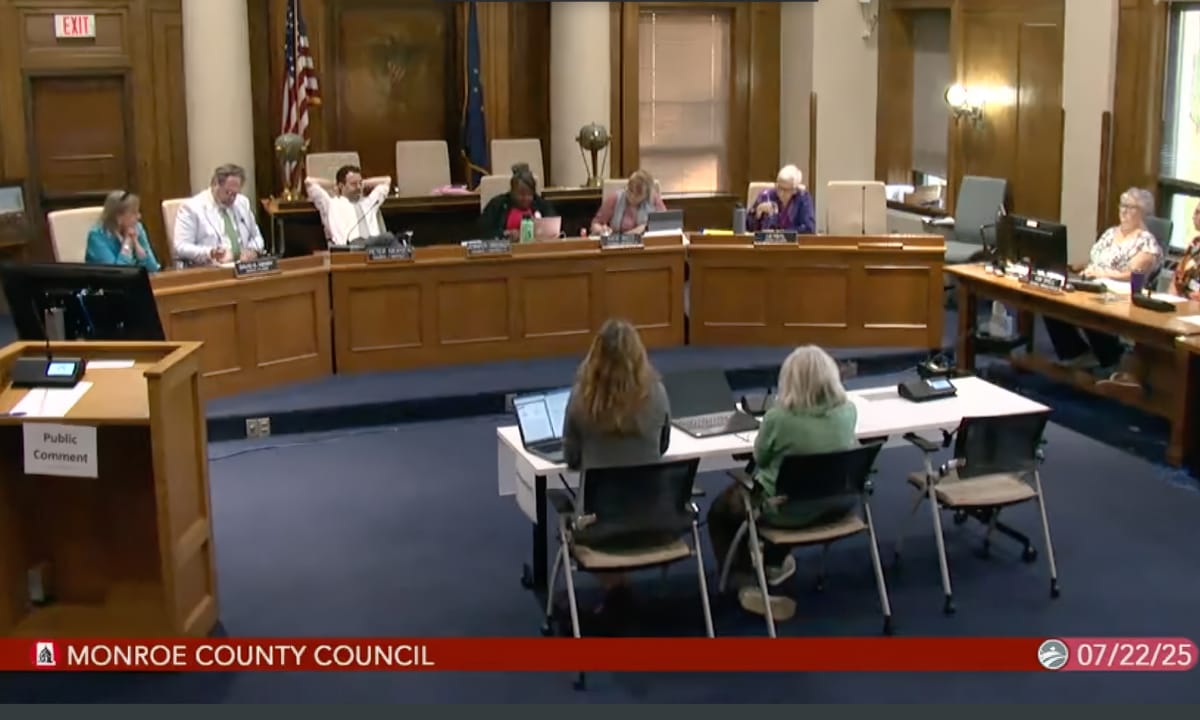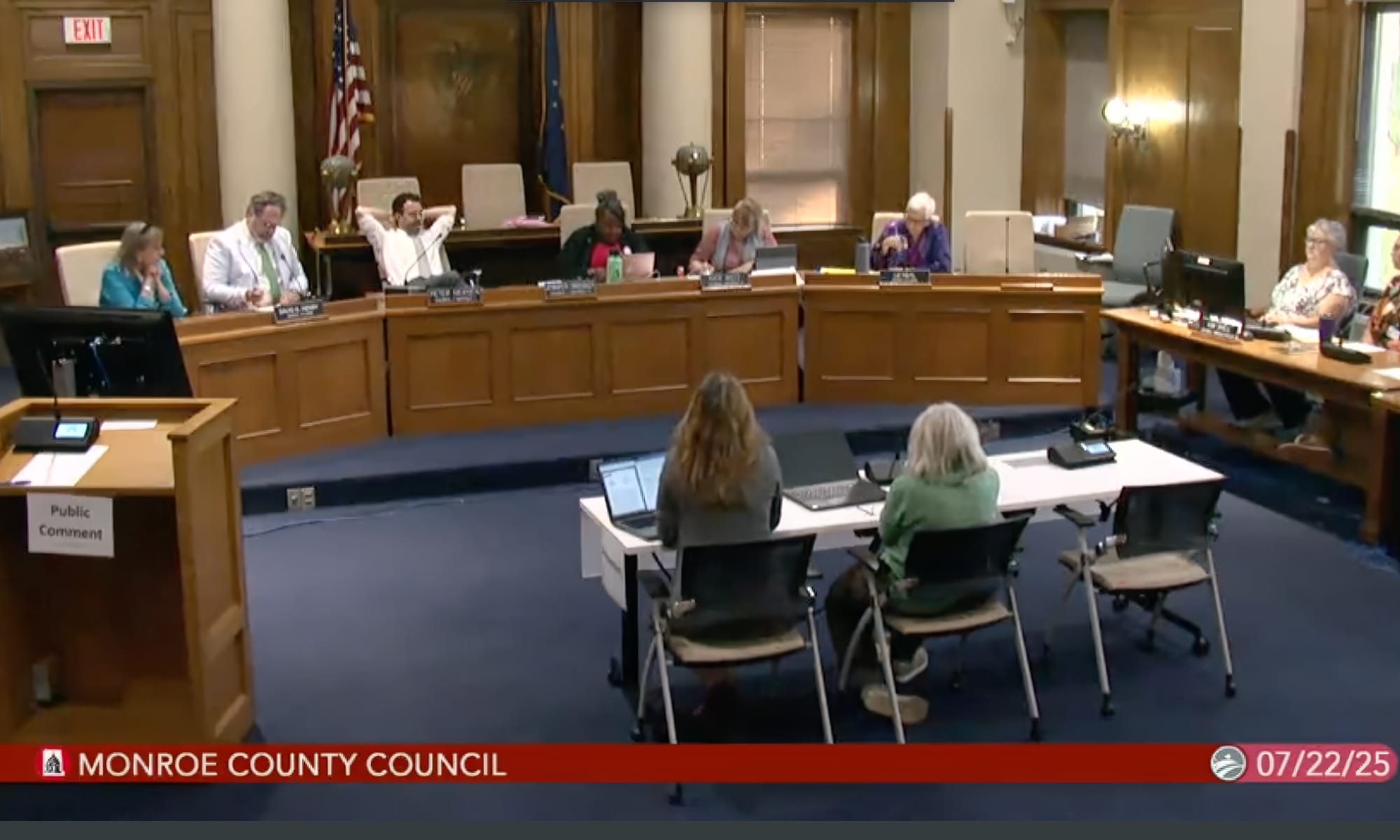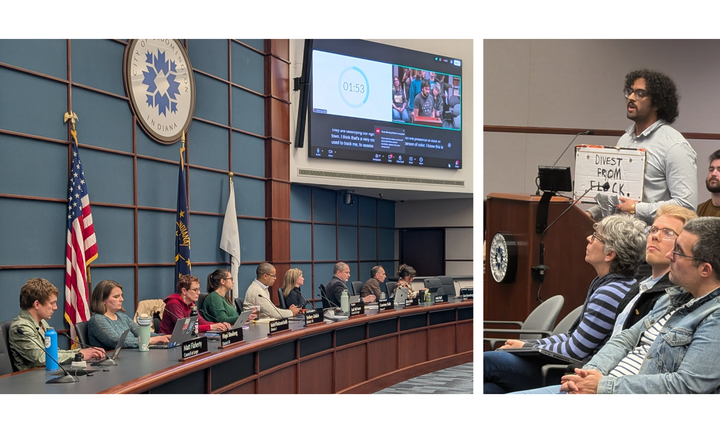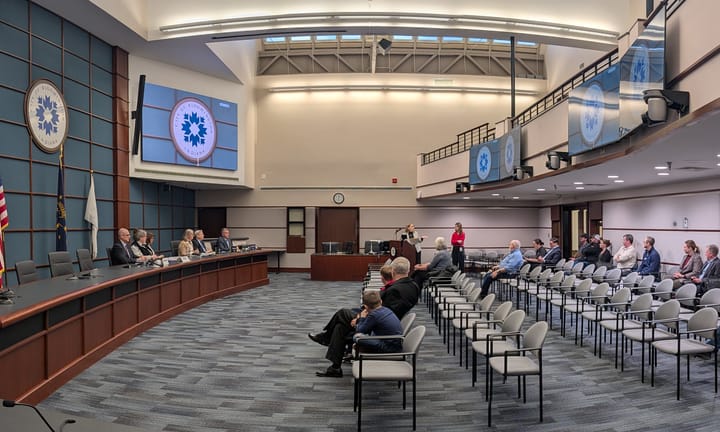Tax limits give new energy to jail opponents as Monroe County lawmakers debate letter to legislature
On Tuesday, the county council sat down with two county commissioners to revise a joint letter asking the legislature to modify state tax law to allow more funding for a new jail. But some residents want the county to rethink the jail project, continuing debate that started in 2008.


The Monroe County Council is facing reinvigorated local opposition to the county’s $225 million plan to construct a new jail as tax limits from the state threaten the project’s future.
Indiana’s new tax law, Senate Enrolled Act 1, limits counties to pledging no more than 25% of local income tax (LIT) revenue to service debt. That poses a problem for the county, which anticipates needing a much higher percentage of LIT revenue to pay interest on the bonds it would need to issue to build a new jail.
At its regular meeting on Tuesday night, the county council sat down with two county commissioners to revise a joint letter asking the legislature to lift the new restrictions or allow Monroe County to access alternative funding mechanisms. The meeting concluded with wording still unresolved and plans to finalize the letter at a later joint session.
But some residents want Monroe County to reconsider the jail project entirely, rekindling debate over a question that has plagued the county since an American Civil Liberties Union lawsuit in 2008 drew attention to overcrowded conditions at the existing jail. Public seating was packed as more than a dozen residents showed up to Tuesday’s meeting to call for a halt to construction plans.
Of the 13 people who spoke during public comment at the start of the meeting, 11 came from a new coalition of groups calling on the county to renovate rather than replace the jail, citing lower estimated costs.
The coalition endorsed a position statement drafted by New Leaf New Life, which calls on the county to instead invest in housing, substance use treatment, and mental health care.
“Evidence-based research has proven that new jails do not solve the systemic issues driving incarceration in our area,” said New Leaf New Life executive director Stacy Flynn, reading from the position statement during public comment. “Expanding the jail will not reduce recidivism or improve community safety—but investing in services like ours does.”
Groups that signed onto the statement include Mother Hubbard’s Cupboard, Exodus Refugee Bloomington, the local chapter of the Democratic Socialists of America, and the anti-jail activist group Care Not Cages.
The council remains largely unpersuaded that fixing the current facility is feasible. But the county’s mounting funding woes gave ammunition to skeptics of expansive construction plans, and some councilors asked to schedule a second meeting with the commissioners to discuss substantive plans for the jail.
“I’m very uncomfortable with the amount of money we’re budgeting,” councilor Kate Wiltz said as the meeting drew to a close. “I’m very uncomfortable with not knowing what the size is of the jail. And I’m uncomfortable that there seems to be just repeated calls for change in how we’re thinking about funding mental health versus incarceration.”
The council’s jail-related discussions on Tuesday, though, largely focused on hashing out revisions to the joint letter, which has been in progress since June. Discussions of the construction plans were not on the agenda.
“We can convene a joint meeting to have that discussion so that we’re all back on the same page,” county commissioner Julie Thomas said. “We’re just here for the letter because we would like the legislature to restore those options that they’ve recently taken away from us.”
Some edits drew a relatively swift consensus. The council and the two commissioners present, Thomas and Jody Madeira, agreed to craft a more general call for a solution rather than outlining specific demands—resolving a question that had been a bone of contention in previous versions.
But too many details remained up in the air for local lawmakers to close in on a final draft. The county will not know how much revenue to expect from Bloomington’s economic development tax and the county’s jail tax, passed in October, until the council’s long-term finance committee meeting on Aug. 1. And counties will not receive state estimates of how the new tax structure will affect their bottom lines until mid-August.
The council and commissioners also want to wait for additional input from Tamm Capital Group (their lobbyist) and the Association of Indiana Counties.
Councilor Marty Hawk questioned whether the new state law really does require the county to reauthorize the LIT annually, a rule that creates uncertainty and would make it hard to sell bonds. Hawk said that taxes for debt payments may be automatically imposed by the state.
A second joint meeting has not yet been scheduled.
The coalition of speakers who objected to the construction plans on Tuesday argued that the cost to renovate the current jail would be far lower than the cost of constructing a new facility, pointing to estimates commissioned by the city that peg construction at $237 million and renovation at $63 million.
But the study that found lower costs for renovation, which was conducted by the Fishers-based firm RQAW Construction, argued against renovating the jail. The report cited significant issues with the current building including roof leaks, aging plumbing and ventilation systems, and limited room for expansion.
The RQAW report—which was approved by county commissioners in October 2023 and received in April 2024—recommended building a new 450- to 500-bed jail.
Over the past year, the county has moved ahead with plans to build a jail at a new site. Officials reviewed several potential locations and eventually settled on a location at North Park. In late 2024, the county council and commissioners approved plans to purchase the property for more than $11 million.
Since then, though, progress has stalled. At the Tuesday meeting, Thomas said the county is working on a purchase agreement, but the North Park property has not yet been purchased.
And the presentation of schematic designs and cost estimates—which was originally set for May 29—has now been pushed to the week of Aug. 19 or later.
The fight over the county jail has been ongoing since 2009, when Monroe County settled a lawsuit by the American Civil Liberties Union of Indiana over “consistently and dangerously overcrowded” conditions. Of the lawmakers who sat on the county’s governing boards at the time, only Marty Hawk is still in her seat. Thomas, who was a councilor at the time, is now a commissioner.
The 2009 settlement requires the county to notify the ACLU if the jail population exceeds 248 and transfer inmates to other county jails if the population exceeds 258 for more than 24 hours or else three times in the same week. Once the settlement lifts, the ACLU could once again sue.
The ACLU Indiana attorney who represented the class-action plaintiffs, Ken Falk, spoke during public comment on Tuesday to urge the county to move forward with replacing the jail, which he said “simply cannot be rehabbed to meet constitutional standards.”
“Studying and re-studying it and approaching it from a thousand different angles is not going to solve the problem,” he added. “You, the county, you are facing liability. You are holding people in a jail that is sorely antiquated—and if something happens in that jail, you’ve been put on notice that the jail is deficient.”
Members of the anti-jail coalition argued at the Tuesday meeting that the courts cannot force Monroe County to build a new jail, and that the county should pursue other options. Micol Seigel, a professor of history and American studies at Indiana University, read from a memorandum prepared by IU Maurer School of Law students.
“While a new jail would be a solution that would satisfy the ACLU, it is not the only option,” Seigel said. “As long as the current jail meets the standards of [the Civil Rights of Institutionalized Persons Act], a new jail is not necessary.”
The original settlement with the ACLU was slated to expire in 2011. After several extensions, it is currently set to expire on Jan. 15, 2026.




Comments ()